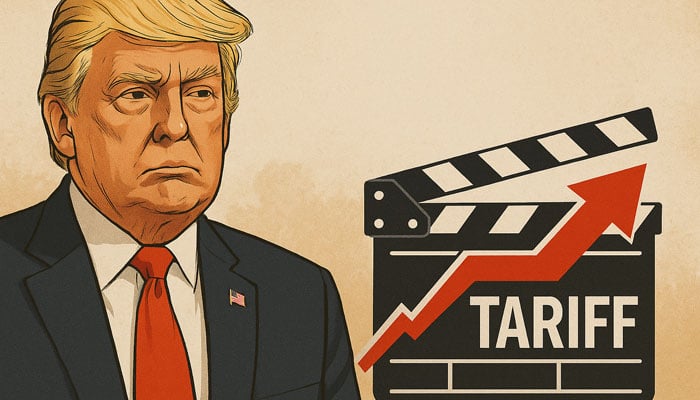Home / Entertainment
Trump’s film tariff plans spark industry alarm: Boon or bane?
Tariffs on foreign films could trigger a you-tax-mine-I-tax-yours response from other countries

As tinsel-towners from around the world flocked to France for the 2025 Cannes Film Festival, US President Donald Trump 'tariff-ied' the global movie industry.
The world’s most powerful head of state — advised by protectionist pundits into believing he could Make America Great Again (MAGA) by slapping tariffs on the world — has now set his zero-sum sights on foreign films.
Like a bull in a china shop, Trump’s curved-horned proposal wrecked the festive mood at the prestigious gathering, leaving the global film community anguished on a day meant to celebrate their art.
The MAGA man is convinced that Hollywood is bearing the brunt of foreign films flooding US theatres.
He thinks his plan if implemented, might push studios and distributors to favour US-made movies — a logic some say reeks more of box office bluster than real-world economics.
Some critics think Trump’s pitch is more political point-scoring than practical policy.
It risks dealing a devastating blow to the global entertainment industry — still convalescing from the pandemic that disrupted so many economies.
The implications stretch beyond just policies and profit. Take Tom Cruise, for instance. The Hollywood star brought people back to cinemas with his blockbuster Top Gun: Maverick when they were unsure about returning to theatres.
Cruise’s film reminded people of the magic of watching movies together. Trump’s proposal comes just days before Mission: Impossible — Dead Reckoning hits cinemas.
If the president’s plan is implemented, even stars like Cruise might find it harder to work with international studios and filmmakers — affecting both the creative and business sides of cinema.
This wouldn’t only impact the US film industry, it could also make Trump even less popular in Hollywood, where many prominent figures openly supported Kamala Harris.
What Trump and his aides aren’t taking into account is that the modern film industry is deeply international — and American films often rely on foreign markets to make money.
Many actors see filmmaking as a global art, not a national business, and Trump’s policy seems to ignore that reality. Some of his remaining supporters in the showbiz industry may quietly distance themselves now that this plan targets the core of their work.
There are fears this move could bomb harder than the worst movie ever made — and for reasons no one can miss.
Hollywood heavily relies on co-productions, foreign talent, and overseas filming locations. Tariffs on foreign films could trigger a you-tax-mine-I-tax-yours response from other countries, much like what happened with Trump’s earlier trade policies.
That would make it harder for Hollywood to rake in box office profits abroad, leading to fewer projects, tighter budgets, job losses, and worst of all, a whole lot less fun.
The timing of the announcement couldn’t be more off, almost coinciding with the Cannes Film Festival, where the industry was focused on unity, creativity, and cultural exchange.
Trump’s tariff threat, many fear, could leave the US out in the cold just when global partnerships have become the cinematic lifeline of the anaemic film industry.
While Trump may score political points by claiming to protect American values, art isn’t so easily contained by man-made “border walls.” Trump’s tariffs go against cinema, which naturally crosses boundaries — good stories travel across languages and lands.
Imagine the American outrage if a country had banned blockbuster Hollywood films when the struggling US silver screen was on a golden roll.
In simple terms, Trump’s plan would not only make movies more expensive — it would limit what fans get to watch and make sure Hollywood films flopped globally.
His plan may also hurt relationships between American artists and their international peers.
While the intention behind the goal may be to protect local films, the result could be the opposite.
Cinemas are supposed to bring people together, not divide them. Stars didn’t revive cinemas just for America — their films did it for movie lovers everywhere.
President Trump’s plan may help him win political points in the short term, but it risks harming an industry that depends on open doors and global audiences.